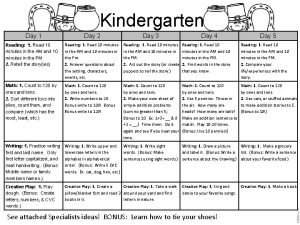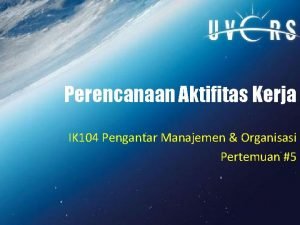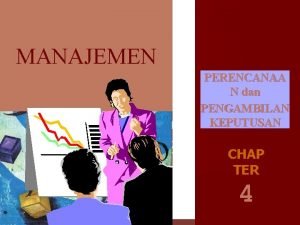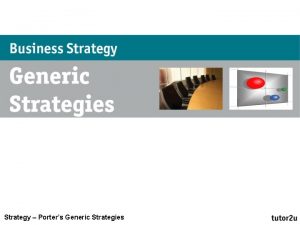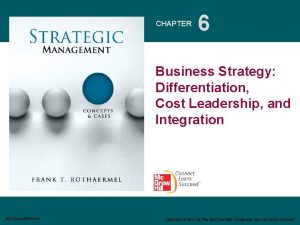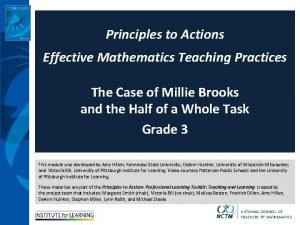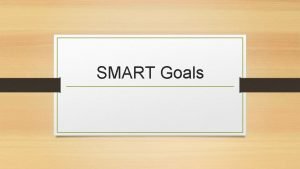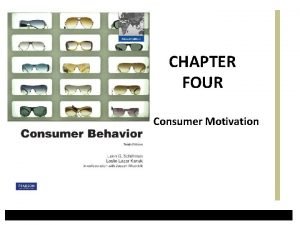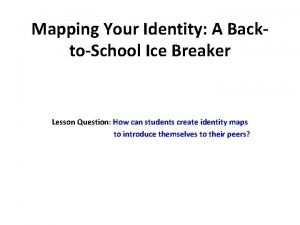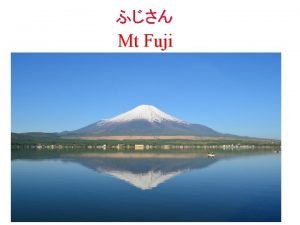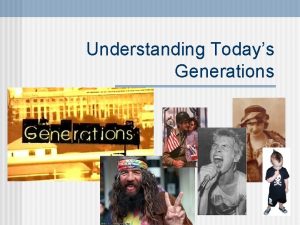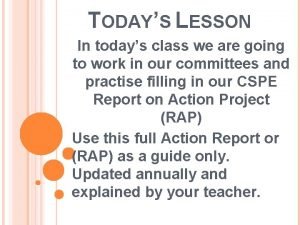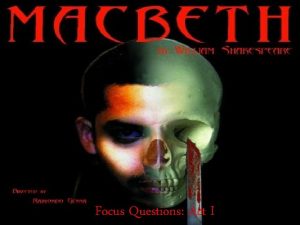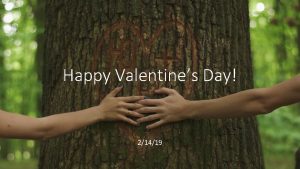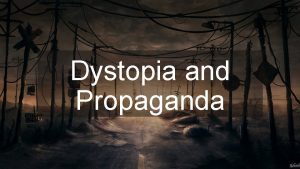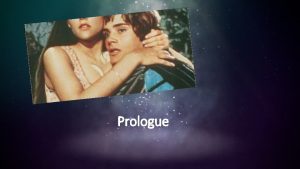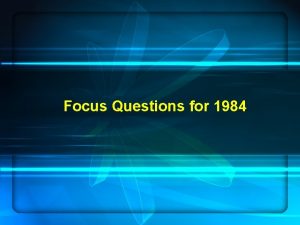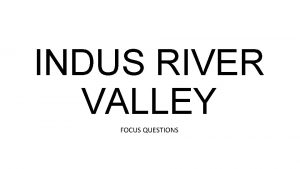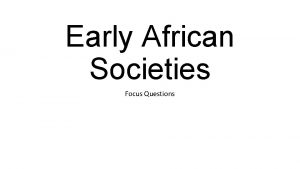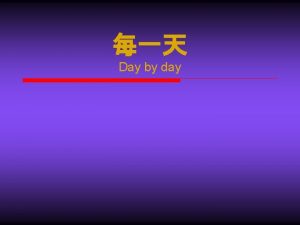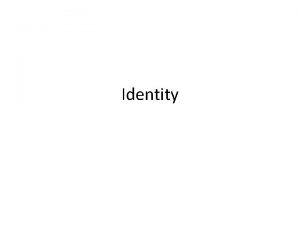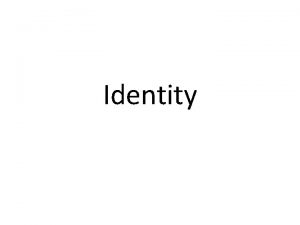Identity Day 11 Todays Goals Focus Questions To















- Slides: 15

Identity Day 11

Today’s Goals Focus Questions • To learn how to • How do poets express deconstruct, understand, themes of self and compare and contrast two identity in their work? poems • to help students broaden their sense of identity from the personal to the national.

Compare and Contrasting poems • This is a favorite of test-makers • Let’s take a poem, which is already hard to find the “right” answer, and then compare it to a second poem! • It’s probably one of the hardest things to do on the state tests • I’ve also seen it on the AP English test, and SAT tests • So… It’s important for us to see HOW do we go about this comparison.

Starting with our authors Walt Whitman (Snap Shot) • 1819 -1892 • lived some of his life in Brooklyn and Manhattan • Largely self-taught, he read voraciously, becoming acquainted with the works of Homer, Dante, Shakespeare, and the Bible. • Crafted one of the most distinctive styles in world poetry. Among the particular traits of that style are the following: a strong emphasis on the individual self, especially the self of Whitman in particular. He has a strong tendency to use free verse in his poetry. • Romantic Movement

Starting with our authors Langston Hughes (Snapshot) • 1902 -1967 Joplin, MO • Spent of his life in Harlem NY • claimed Paul Lawrence Dunbar, Carl Sandburg, and Walt Whitman as his primary influences • He is particularly known for his insightful, colorful portrayals of black life in America from the twenties through the sixties. • Harlem Renaissance Movement

What is identity? • How do you define yourself? • Create a list of things, ideas, beliefs, objects, places, people, etc. that make you who you are.

What is Personal Identity? • Remember Audrey Lorde’s poem “Hanging Fire”? We recognize that the speaker had a very personal identity. (ashy, braces, not on math team) • A personal identity is the concept you develop about yourself that evolves over the course of your life. • This may include aspects of your life that you have no control over, such as where you grew up or the color of your skin, as well as choices you make in life, such as how you spend your time and what you believe.

What is identity in poetry? • People often write about what they know best, and in many cases, writers give us insight into their own worlds through their poetry. • When we hear a poem from a personal viewpoint, we are able to analyze the identity of the poem/speaker. • However, not all poets speak from a “personal” viewpoint. • In the poems we’ll compare as a class, they are focused on an American Identity. • But what is that?

The American Identity • Culturally, Americans have defined themselves in many ways—through artistic expression, ethnic traditions, work and play, and home and community life. • To name a few things that define Americans: • Diversity • A fair judiciary • constitutional protections • and the ability to achieve the American dream • Freedom • Not just ideas thought- also include people and history

Let’s Read! • Starting with Whitman's… • Watch the reading • As it is being read, annotate the poem/ complete QUESTIONS • You will hear the poem twice from two different recordings • https: //www. youtube. com/watch? v=EQPB_1 Qm 1 TE • https: //www. youtube. com/watch? v=JWUq. Nn. CHm. Ik • https: //www. youtube. com/watch? v=8 f. F 8 iqtc. Cv. Q • https: //www. youtube. com/watch? v=6 Cm. Kf 9 n. Z_4 I

Reading the poems: Whitman • Who does the speaker represent? • What does the speaker care about? • What is the tone of the poem? • How does the speaker feel about the America he hears singing? • Who is the America that Whitman hears? Who is not included? • Can you relate to this poem? Why or why not? • If you could visualize the poet speaking what would that look like/sound like?

Reading the poems: Hughes • Who does the speaker represent? • What does the speaker care about? • What is the tone of the poem? • How does the speaker feel about the America he hears singing? • Who is the America that Langston hears? Who is not included? • Can you relate to this poem? Why or why not? • If you could visualize the poet speaking what would that look like/sound like?

Reading the poems: together • How are the speakers of the poems different from the poet? • How do each of the speakers in the poem create meaning?

Groups of 2, Groups of 4 • Find a group of 4, then break yourselves into two groups of two. • Create a character web for the speaker in one poem with your partner. The other pair should do the other poem. • Reconvene as a group of 4, create a Venn diagram comparing the two speakers. • share differences and similarities between the speakers. • The discussion should eventually include how the speaker adds to the meaning of the poem. • There should also be discussion of how the speaker and author/poet may be different.

Independently: • Write a paragraph discussing the following: • How do the different identities of the authors inform the meaning in the poems they wrote? • How does each speaker in the poem view America? • What is each speaker’s experience in America? Use evidence from the poem. • Which do you prefer and why?
 Day 1 day 2 day 3 day 4
Day 1 day 2 day 3 day 4 Strategic goals tactical goals operational goals
Strategic goals tactical goals operational goals Strategic goals tactical goals operational goals
Strategic goals tactical goals operational goals Day 1 day 2 day 817
Day 1 day 2 day 817 Language
Language Porter competitive strategy
Porter competitive strategy Cost leadership and differentiation
Cost leadership and differentiation Actor focus vs object focus
Actor focus vs object focus Establish mathematics goals to focus learning
Establish mathematics goals to focus learning General goals and specific goals
General goals and specific goals Motivation in consumer behaviour
Motivation in consumer behaviour Examples of identities of a person
Examples of identities of a person The crucible focus questions
The crucible focus questions Fuji
Fuji Todays generations
Todays generations Today's class
Today's class
